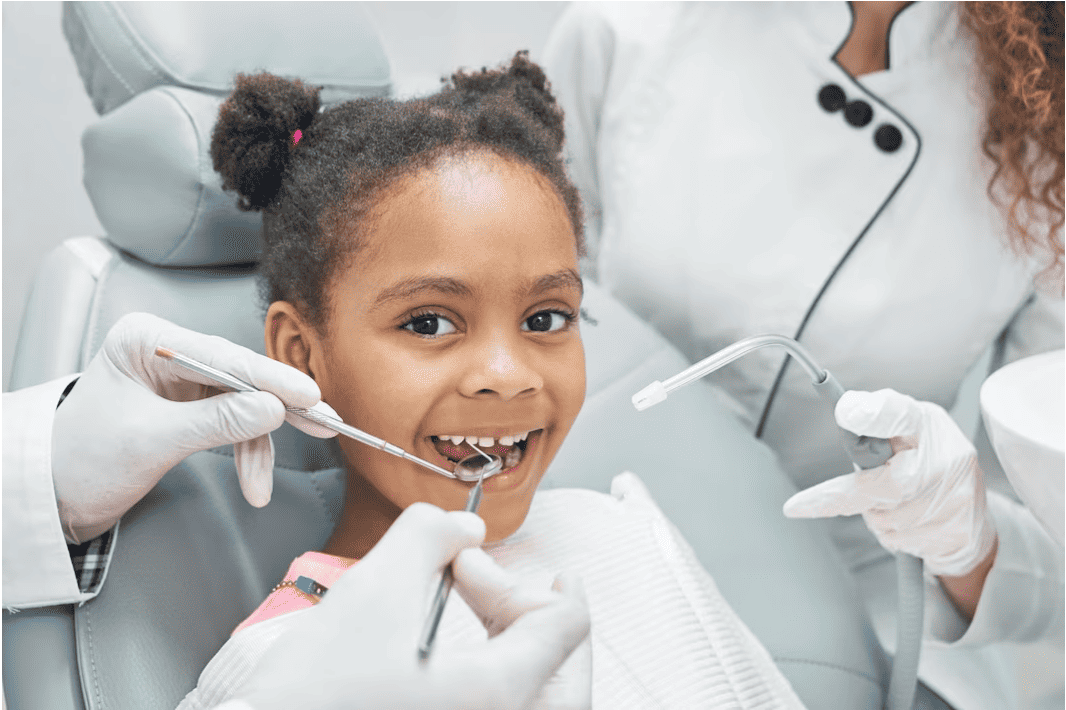
24 May How to Prepare Your Child For Their First Visit to the Family Dentist
So, It’s Time For The Dentist

We all share memories, both pleasant and unpleasant, when it comes to when we were young. A child’s first trip to the dentist can be an intimidating experience. It seems to be the norm whenever anyone reminisces about their childhood. However, with the right preparation and approach, parents can help their child feel comfortable and confident during this important visit. By establishing positive dental habits and discussing what to expect, parents can ensure that their child’s first dental appointment is a positive and stress-free experience. If you are looking for suggestions on how to change the narrative, let’s explore some effective strategies to prepare your child for their inaugural visit to the dentist, fostering a lifetime of good oral health habits.
Start Early: Introducing Dental Care
Good oral hygiene habits should begin even before a child’s first tooth emerges. As soon as your baby’s first tooth appears, gently clean it with a soft cloth or infant toothbrush. This early introduction to oral care will help your child become familiar with the sensation and develop a positive association with dental hygiene. Gradually introduce toothpaste and establish a routine of brushing twice a day.
At What Age Should They Start?
The American Academy of Pediatric Dentistry (AAPD) recommends that a child should have their first dental visit by the age of one or within six months after their first tooth erupts, whichever comes first. This early visit allows the dentist to evaluate the child’s oral health, provide guidance on proper oral hygiene practices, and address any concerns or questions parents may have. It’s important to note that every child is unique, and their dental needs may vary. Therefore, it’s best to consult with your pediatrician or pediatric dentist to determine the most appropriate time for your child’s first dental visit based on their individual circumstances.
Choose a Pediatric Dentist
Selecting the right dentist for your child is crucial. Look for a pediatric dentist who specializes in treating children and has experience in making dental visits pleasant and comfortable for young patients. Pediatric dentists are trained to handle the unique needs and anxieties of children, making them more adept at creating a positive dental experience.
Foster a Positive Attitude
It’s important to convey a positive attitude about dental visits to your child. Avoid sharing any negative experiences or dental anxieties you may have. Instead, emphasize the importance of dental care and highlight the benefits of a healthy smile. Reading children’s books or watching educational videos about dental visits can help familiarize your child with the process in a fun and engaging manner.
Role Play and Familiarization

Role-playing can be an effective way to prepare your child for their first trip to the dentist. Pretend to be the dentist and count your child’s teeth using a mirror and a small flashlight. Allow them to take turns being the dentist as well. This playful activity helps alleviate any fears by making the dental visit seem less daunting. Additionally, consider arranging a pre-visit consultation with the dentist’s office to familiarize your child with the environment, meet the staff, and see the dental equipment.
Communicate and Answer Questions
Encourage your child to ask questions about their upcoming dental visit. Address their concerns honestly and provide simple, age-appropriate explanations. Explain what the dentist will do during the appointment, such as counting and examining their teeth, and reassure them that the process is painless. Emphasize that the dentist’s job is to keep their teeth healthy and strong.
Rewards and Positive Reinforcement
Offering small rewards can motivate your child and make the dental experience more enjoyable. Plan a special outing or treat after the visit, such as a trip to the park or their favorite ice cream shop. During the appointment, praise your child’s bravery and cooperation, reinforcing positive behavior. This positive reinforcement helps build their confidence and encourages them to view dental visits as a positive experience.
Remember That It Starts With You
Practicing good dental hygiene yourself is an essential way to prepare your child for dental visits. When children see their parents prioritizing oral health and maintaining a regular dental care routine, they are more likely to adopt these habits themselves. Here are a few ways in which your own dental hygiene practices can positively influence your child’s readiness for dental visits:
- Setting a Positive Example: Children learn by observing their parents’ behaviors. When they see you brushing and flossing your teeth regularly, they understand that oral hygiene is an important part of daily life. Your commitment to oral health sends a powerful message that dental care is essential and worthy of their attention.
- Reinforcing the Importance of Dental Care: As you practice good dental hygiene, take the opportunity to explain to your child why it matters. Discuss how brushing and flossing help prevent cavities and keep teeth and gums healthy. By regularly emphasizing the importance of dental care, you lay the foundation for your child to understand why dental visits are crucial for maintaining oral health.
- Encouraging Participation: Involve your child in your own dental care routine. Allow them to watch you brush your teeth, and as they grow older, encourage them to brush their teeth alongside you. This shared experience helps them become familiar with the process and understand that dental hygiene is a regular part of everyone’s routine.
- Providing Guidance and Assistance: When you practice good dental hygiene, you can guide and assist your child in developing their own oral care habits. Show them proper brushing and flossing techniques, and help them establish a routine. By demonstrating and assisting in their dental care, you instill confidence and readiness for dental visits, as your child becomes accustomed to oral care practices.
- Open Communication: As you practice good dental hygiene, it creates opportunities for open discussions with your child about dental care. Encourage them to ask questions, share their thoughts or concerns, and provide age-appropriate explanations. This communication builds trust and a sense of comfort, making it easier for your child to express any fears or anxieties they may have about dental visits.
- Stressing the Positive Aspects: While dental visits can be unfamiliar or intimidating for children, you can emphasize the positive aspects. Discuss how dental appointments help keep their teeth strong and healthy, and highlight the friendly and caring nature of dentists and dental staff. By focusing on the positive elements of dental care, you can help alleviate any apprehensions your child may have.
You And Your Child Are A Team

Viewing you and your child as a team when it comes to dental visits can greatly enhance the overall experience and promote a positive attitude towards oral health. Involve your child in the decision-making process related to their dental care. Discuss the importance of dental visits and treatment options in an age-appropriate manner. By giving them a sense of ownership and involving them in decisions, they will feel more empowered and engaged throughout the dental visit.
Effective communication is key to building a strong team dynamic. Encourage your child to express their thoughts, feelings, and concerns about dental visits. Listen attentively to their questions and address them with patience and understanding. This open and respectful communication fosters trust and helps your child feel heard and supported.
Preparing your child for their first trip to the dentist involves establishing good dental habits, choosing a pediatric dentist, fostering a positive attitude, role-playing, and open communication. By implementing these strategies, parents can alleviate their child’s anxieties and ensure a smooth and positive dental experience. Remember, the goal is to lay the foundation for a lifetime of good oral health habits, making dental visits an integral part of their overall well-being. With your guidance and support, your child will develop a positive attitude towards dental care, setting the stage for a healthy smile that lasts a lifetime.


Sorry, the comment form is closed at this time.